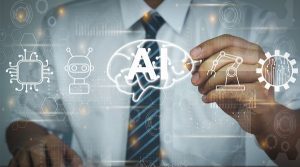
What is in Supply Chain?
Artificial intelligence (AI) is transforming supply by improving planning, production, management, and optimization. AI processes large amounts of data, predicts trends, and performs complex tasks in real-time. This helps make better decisions and boosts efficiency.
Recent advancements like generative AI and chatbots have shown how useful these systems are for supply chain management. The COVID-19 pandemic highlighted the fragility of global supply chains, showing a need for better management tools.
A subset of AI, machine learning (ML), goes beyond traditional software capabilities. ML can forecast customer demand, identify patterns, make market predictions, and even interpret text and voice. These abilities optimize supply chain workflows in ways traditional systems can’t.
While AI offers many benefits, understanding its challenges is crucial before implementation. Introducing AI into a supply chain requires time and resources for preparation.
How Does AI in Supply Chain Work?

AI improves supply chains by optimizing routes, streamlining workflows, improving procurement, minimizing shortages, and automating tasks.
Supply chains are complex and depend on timely, organized shipments. AI finds patterns and relationships to keep everything balanced. This helps optimize logistics from warehouses to cargo freighters and distribution centers.
Modern supply chains need thorough oversight to avoid disruptions. AI helps with forecasting demand, predicting production capacity, and gaining insights from IoT data across the supply chain.
AI can also track inventory levels and market trends. It enhances supply chain visibility, automates documentation, and intelligently manages data. This transparency provides valuable data to all stakeholders.
Benefits of AI in Supply Chains
- Lower Operating Costs: AI quickly learns repetitive tasks and performs them accurately, reducing inefficiencies and bottlenecks.
- Advanced Real-Time Decisions: AI processes historical and real-time data to make real-time decisions, often providing conversational answers.
- Reduced Errors and Waste: AI identifies behaviors and patterns, allowing algorithms to detect flaws like employee errors or product defects early.
- Tailored Inventory Management: AI forecasts demand, helping to gauge customer interest and adjust accordingly. This improves decision-making and demand forecasting.
- Improved Warehouse Efficiency: AI evaluates material quantities and improves service levels by planning optimal routes for machinery and workers.
- Better Supply Chain Sustainability: AI uses predictive analytics to optimize truckloads, predict delivery routes, and reduce product waste, making supply chains more sustainable.
- Optimized Operations Through Simulation: AI-powered simulations help managers understand their operations better and find areas for improvement.
Challenges of AI in Supply Chain
- Downtime for Training: Training employees on new technology can cause downtime. Companies should prepare for this and inform partners.
- Startup Costs: Implementing AI involves costs for software and machine learning models. Companies need to clean and prepare their historical data for AI algorithms.
- Complex Systems: AI systems require constant monitoring and fine-tuning to perform well on a global scale.
AI Risks:
- Inaccurate Data: AI relies on large datasets which might contain inaccuracies or biases, requiring human oversight.
- Overreliance on AI: AI should augment human intelligence, not replace it. Human experts are essential for managing risks.
- Security and Privacy: Increased data collection for AI models raises risks of hacking and privacy violations. Companies must safeguard consumer data.
Steps to Prepare a Supply Chain for AI

Assess Current Logistics:
- Identify pain points and constant issues in your current logistics network.
- Clean data to understand how to use structured and unstructured data.
Create a Roadmap:
- Prioritize the issues to address first based on your supply chain needs.
- Tackle the most pressing issues before moving on to lesser ones.
Design and Select a Solution:
- Evaluate different AI systems to find the best fit for your supply chain goals.
- Consider consulting with industry experts for guidance.
Begin Implementation:
- Work with your internal IT team and AI vendors to get the system running.
- Prepare for and manage any setbacks or errors during the process.
Prepare Employees:
- Develop a communication plan for employees before implementation.
- Schedule adequate downtime for training and prepare a training plan.
Continuous Monitoring:
- Regularly test the AI solution and track its performance.
- Periodically refine the system based on feedback and testing results.
By carefully implementing AI, businesses can revolutionize their supply chains, improving efficiency, sustainability, and decision-making. Understanding both the benefits and challenges is key to a successful AI integration.
Conclusion
Embracing AI in supply chain management offers significant advantages from lowering operating costs to enhancing operational efficiency and sustainability. AI’s ability to process vast amounts of data in real allows for improved decision-making, advanced forecasting, and the automation of complex tasks. However, while the benefits are substantial, businesses must also navigate the challenges associated AI implementation, such as downtime, startup costs, and maintaining data accuracy and security.
For businesses aiming to leverage AI, it’s crucial to prepare meticulously. This involves assessing current logistics, prioritizing pain points, designing tailored AI solutions, and ensuring comprehensive training for employees. Continuous monitoring and refinement of AI systems will help maintain their effectiveness and alignment with business goals.
Incorporating AI into supply chain management is not just about adopting new technology; it’s about transforming operations to be more resilient, efficient, and forward-thinking. With the right approach, AI can revolutionize supply chains, making them better equipped to handle future challenges.









